TV Review: Heroes, Volume 3
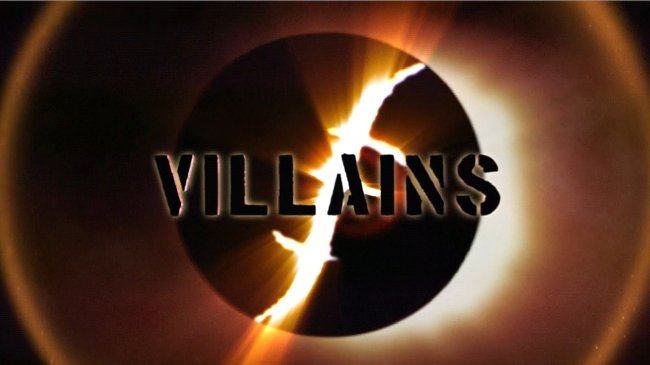 | | Heroes, Volume 3: Villains |
[WARNING: There are spoilers throughout this review.]
If all you know about the current season of NBC's Heroes comes from magazine articles and Nielsen ratings, you are probably thinking that the show sucks. The second and third volumes of the hit series have met with a plague of bad press, and even though the show remains NBC's top performer, there is a buzz of people who seem to think the show will not be renewed for a fourth season. Despite this, however, there is still a large and rabid fanbase that defends the show against all criticism, and on Internet TV sites like TV.com, Heroes can almost always be found in the top five fan favorites. This begs the question, then: who's right? Has Heroes fallen from grace--going from a critically-acclaimed and absolutely perfect first season to a second and third season of one of the worst television shows on today--or does it remain a great work of art that should be worshipped rather than critiqued?
The answer, of course, is neither. "Volume 3: Villains" is far from perfect, but it isn't as bad as the critics and naysayers are making it out to be. In fact, nearly all of the criticisms that can be raised about the third volume of episodes can be levelled against the first season, the season all the critics and magazine editors seem to think is some kind of gold mine of perfection. Part of the disconnect stems from the phenomenon of fan hatred, a groupthink of popular opinion--driven partially by Neilsen ratings--that overwhelms the voice of the still-adoring fans. Part of it also comes from those who have forsaken the show, those who seem to believe that Heroes was once a wholly original concept with characters that never made questionable decisions and plots that never, ever had holes in them.
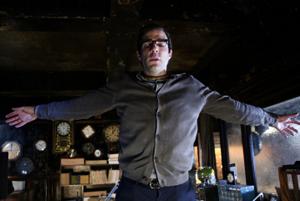 | | Sylar is given more dimension and more electricity |
To be fair, Volume 3 has its share of unoriginality--from Mohinder's very Seth Brundle-esque transformation into an insect man to the super soldier serum ripped from the pages of Captain America--but that should be expected from a show that is, at its core conceptual level, a rip-off of the X-Men and several other comic books. It also has its share of questionable character moments--from Linderman's inexplicable decision to heal Angela Petrelli to Elle's odd choice to try and make Sylar evil again--but the show has had these moments from the very first episode, like when Angela Petrelli thought that shoplifting was a good idea. Volume 3 also has a few small plot holes, most of which revolve around time travel, but anybody who's been watching the show and thinking that it has always made perfect continuous sense is delusional at best. For many loyal fans, the show has always been about the adventure and the fun, and for those fans, Volume 3 continues to deliver.
The writers of Heroes continue to impress me with their ability to juggle a huge cast of characters. While the show may occasionally lack an adequate focus on individual character arcs, Volume 3 continues to demonstrate that the writers are vigilant in keeping track of who is where, who has met whom, how who feels about what, etc. When characters cross paths, as they do frequently, it always makes sense. For example, Hiro comes across the Haitian in "One of Us, One of Them," and Hiro thinks he is a villain, which is logical considering that the last time these two characters interacted--way back in Season 1--the Haitian was a villain. Of course, the Haitian doesn't remember Hiro, since that interaction took place in the future. Other examples include when Nathan met Tracy and when Matt reunited with Peter late in the volume.
 | | Arthur Petrelli--played by acting veteran Robert Forster--is one of the show's best villains, even if his motivations remain unclear |
Many of the characters have intriguing arcs in Volume 3, and it is more apparent upon repeated viewings. Nathan, for example, is given a new motivation in the first episode, in which he is resurrected and finds religion. He immediately starts talking about people with abilities as angels capable of saving the world, and though the appearance of the formula and Dr. Zimmerman quell his religious ferver, his experience in Haiti towards the end of the volume reinforces his beliefs in the need for special people to help change the world. This is a perfectly logical and interesting character progression, and it masterfully puts him at odds with his brother, Peter, mere moments after they reconcile their other disagreements. How this evolves to Nathan asking the president (Michael Dorn; aka Worf) to hunt down his fellow specials--including his brother--is yet to be seen, however.
Claire's story is also exceptional in that her journey is fluid and understandable. She starts the volume by essentially getting raped by Sylar. As with many rape victims, she chooses empowerment over self-pity, and she spends much of the rest of the volume trying to prove that she can be useful--despite a numbness inside that is as metaphorical as it is pervasive--and is eventually able to avenge herself against her attacker (though no one should honestly believe that Sylar is actually dead). She even gets a chance at rebirth following the eclipse, and when she is taken back in time to see her younger family, her attempts to preserve her own innocence and restore her faith in Noah is genuinely touching.
Hiro, though he is a bit too light and goofy in the first few episodes, provides some of the best character moments towards the end of the volume, especially when he meets up with his dying mother. His sudden transformation into a mental 10-year-old seems an odd choice at first, but it ultimately helps define his character's central conflict (that he doesn't want to grow up or become disillusioned) and allows him to travel 16 years into the past after vowing never to go back in time again. The final chapter of his arc this season--losing his powers and switching places with Ando, so to speak--sets up for some interesting character developments next year.
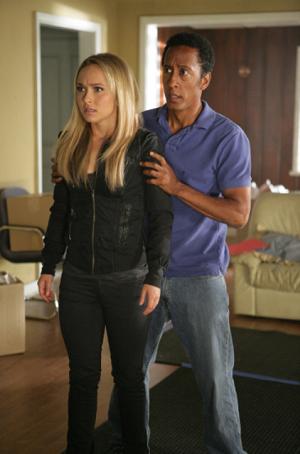 | | Moral gray areas are explored well in "Angels and Monsters" |
Even some of the minor characters have interesting stories to tell. Stephen Canfield, for example, is a character who appears in only one episode, "Angels and Monsters" (one of the best of the volume), and it is apparent that there is far more to his story than is revealed. Even the one-dimensional Flint is given motivation and the hints of a backstory when he tells Mohinder, "Without abilities, I'm nobody. I already been nobody."
Of course, not all the character arcs shine as brightly. Noah's single-minded determination to kill Sylar never changes, and his character never shows a single hint of remorse for helping to create the monster he is hunting; Sylar's story, on the other hand, is far too mercurial, presenting the audience with a character whose wild swings between good and evil are too extreme and sudden to sympathize with; Mohinder, though his physical changes and attraction to Maya offer new motivation, is essentially repeating past mistakes by working to cure a disease with a company that has alterior motives; and a few characters, like Maya and Tracy, seem to exist solely for the convenience of plot and have no journey to empathize with.
Back on the positive side of things, though, the visual and special effects continue to impress. Adam's death by rapid aging and future Peter stopping time at the bank robbery are awesome little spectacles of big-budget movie quality. There are also neat little reminders of the first season, like when Matt, Ando, and Daphne go in search of Isaac's sketchbook, and especially in the episode "Villains," in which the time period of the first season is revisited. Much of the first season was built upon the neat but improbable intertwining of storylines, and that is repeated in volume three, like when we learn that Meredith is responsible for the train wreck that Claire ran into back in the very first episode of the show.
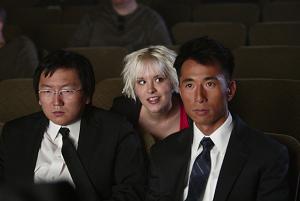 | | Some scenes are a little too goofy, but at least the show can't be accused of taking itself too seriously |
There are also several moments of humor, some that work and some that don't. Among the gags that work are Hiro trying to capture Usutu, Matt talking to his turtle, and Sylar in the elevator learning how his new lie-detector power works. Among the ones that don't, however, are Sylar's taking charge at the crime scene with an over-the-top performance and Brooklyn accent, and the long sequence of scenes involving Hiro and Ando at the movie theater with the silent movie music blaring throughout the silly hijinks.
It is the plot itself, though, that most people seem keen on criticizing. Volume 3 has two main storylines: the villains escaping from Level 5, and the plot to control and create the formula. Having both of these driving forces--either of which could have stood alone as a plot--happening at once is occasionally too much, but they intertwine enough to justify their simultaneous inclusion. Of the two, the villains storyline is the most successful.
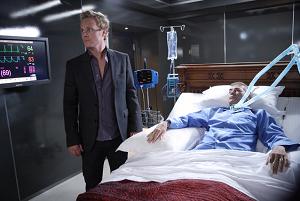 | | There are many deaths in Volume 3, none more shocking than the death of Adam Monroe |
The hunting of the Level 5 escapees creates some of the best dramatic moments of the volume, from the forcing together of Noah and Sylar at the bank robbery to Claire's confrontation with the creepy Eric Doyle. It also highlights the main motif of the volume--the grey area between hero and villain--and has enough meat to carry several characters through interesting paths.
The hero formula, in all its various forms, is a little less successful as a driving force for the plot, though it isn't all bad. It starts out interesting enough with Hiro and Ando, but it gets bogged down by the largely unexplained motivations of Arthur Petrelli (though he is a great villain), the existence of a strange paste in Africa that seems capable of doing the same thing temporarily, and the fairly lame quest for the catalyst (why is Claire special again?). Additionally, it is stated several times that the formula will ultimately result in the world tearing itself apart, but the exact mechanism for this is never explained, explored, or even questioned. However, there are some golden fruits of this plotline, such as Hiro and Claire going to the past, the creation of super soldiers, and the entirety of Nathan's journey.
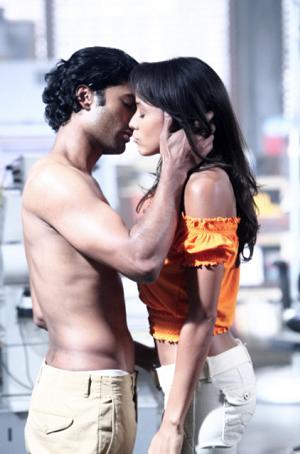 | | Mohinder and Maya share the sexiest scene in Heroes history |
There are also a few plot threads that seem fairly pointless. It is stressed that Peter needs to understand Sylar's power if he is to save the world, but almost immediately after he does, his powers are taken away and the need for Sylar's power is made moot before it is ever explained. The eclipse offers some subtle progress for Nathan and Claire, but when it's over and everybody has their powers back, one has to wonder what the point of it is supposed to be (not to mention how a solar eclipse can be a global event--taking place in California, Kansas, Haiti, and New York simultaneously--can last several hours, and can affect powers that are supposed to be genetic and evolutionary in nature). When Elle's electrical powers malfunction, Claire seems to think that it is a symptom of some greater epidemic, but once Elle gets to Pinehearst, that thread is left dangling. It's also a little frustrating that the show has been promising since future Hiro first appeared to Peter back in Volume 1 that the Heroes would band together, and despite one very brief scene at the end of the episode "It's Coming," they continue to be fractured and on separate paths. Of course, unfulfilled plots like these are not new to the show; the resolution to Volume 1 is still not satisfactorily explained, if you ask me, and I still want to know why the writers devote so much time to Sylar collecting powers when he only ever uses one or two favorites.
Time travel is a significant problem for the show. The audience is shown the future on multiple occasions, but that future never comes to pass (with the exception of Isaac's paintings--more on them in a moment--and one or two oddities, like Ando having powers). I'm not too concerned about where Peter gets his scar or where Sylar gets that kid, because things we are shown in future episodes never seem to pay off later. This is annoying. On the plus side, though, the set up for Volume 4 seems to show us the beginnings of a future we saw all the way back in Volume 1 (minus Hiro's ability, Peter's scar, Nikki's being alive, etc.).
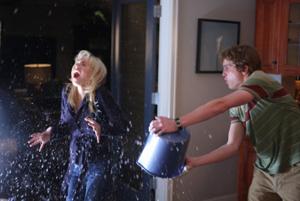 | | Elle gets wet |
Also, I'm sick of Isaac Mendez paintings/drawings. The character died two volumes ago, and the future has been changed more than once since then. It is absurd and unjustifiable to keep using his images as a plot device, especially when there are characters who are alive and can paint the future. If a single Isaac Mendez image is used as a predictive device in Volume 4, I will be extremely disappointed. This is probably the only complaint I can level against Volume 3 that I cannot level against Volume 1.
Still, despite these complaints, Volume 3 is a hell of a ride. The characters are interesting, the action is fast-paced, the plot is engaging, the acting is top-notch, and the show continues to be the best example of how to adapt a comic book style on the small screen. The show has not lost its fans--despite what the flamers, magazines, and obsolete ratings systems would have you believe--and it is still one of my favorite things to watch on TV.
FINAL SCORE:





Despite its flaws, Volume 3 is a great run of episodes that is better with repeated viewings.
|
-e. magill, 12/15/2008
|
|